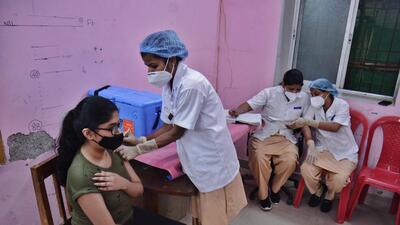Over 91.5% of adults in the state have received at least one dose and 70.4% of adults are fully vaccinated with both doses
Mumbai With widespread hybrid immunity due to natural infections and high vaccination coverage, the possibility of a fourth wave hitting Maharashtra is bleak, according to experts. The virus will, however, continue to circulate in low numbers, they predict.
Daily new cases in Maharashtra have been below 1,000 since February 25. Amidst the waning third wave, the state has also announced the opening of schools and colleges and is likely to introduce complete relaxations soon. Over 91.5% of adults in the state have received at least one dose and 70.4% of adults are fully vaccinated with both doses. As many as 15,27,551 people have received the third dose.
“The large exposure to the virus, the coverage of double vaccinations and booster doses in states like Maharashtra will keep the fourth wave at bay,” said Dr Shashank Joshi, member of the state’s Covid-19 task force. “We are unlikely to see a fourth wave unless a new, virulent, more contagious variant of concern evolves. In any case, we will have to learn to live with Covid as the virus will remain in circulation,” he said.
According to Joshi, pandemics, that the world has seen so far, have lasted for around three years. “We are already in the third year of Covid-19,” he said and added that there should not be any room for complacency. “The emphasis on indoor masking and vaccinations should continue,” he said.
Given the high population density of cities like Mumbai, the risk of cluster transmission always remains high. As schools, colleges and offices open fully, experts say that authorities must watch out for such cluster transmissions and deploy well-planned, targetted genome sequencing to remain alert about emerging variants.
“My hunch is that the pandemic has ended with the Omicron-driven third wave,” said Vellore-based virologist Dr T Jacob John. “We will now likely be in the endemic phase wherein there will be slow spread, steady but low number of cases. Even if we look at the virology and epidemiology point of view, a fourth wave is most unlikely now,” he said.
John highlighted the importance of being vigilant, continuing genome sequencing and masking. “The masking mandate is not just going to help limit the spread of Covid, but also other respiratory illnesses and infections like tuberculosis,” he said.
A statistical forecasting study by researchers from the Indian Institute of Technology (IIT), Kanpur, published on a pre-print server MedRxiv, has predicted that the fourth wave in India will set around June 22, peak on August 23 and end by October. The study, yet to be peer-reviewed, also states that the occurrence of a new variant, the effect of vaccination- first, second and booster dose- may affect the arrival of the fourth wave.
But such predictions in the past have failed and it’s best to not consider them as speculations, according to task force member Joshi.
Infectious disease expert Dr Om Srivastava, who is also of the state’s Covid-19 task force, said that it’s best not to predict, but be prepared for any situation. “It’s time for us to bring back some sense of normalcy, with stringent masking norms in public places. If we are likely to see the fourth surge, a lot of factors like temperature, humidity, crowding and overall immunity within the population will come into play. Thus, predicting the fourth wave is difficult,” he said.

